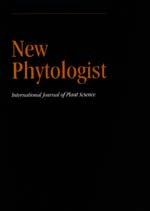No CrossRef data available.
Article contents
Abstract
Membership of our Board of Advisors to the Editors has remained almost static since the Board was founded in 1995, but significant turnover begins this summer. Accordingly, I offer a warm welcome to new members of the Board and thank those who have agreed to extend their membership. I thank especially those leaving the Board for their invaluable support during the first three years of its life. The workplaces and interests of Board members reflect both the international base of the New Phytologist and the wide range of subjects that it regularly publishes. SCI ratings support the belief that the New Phytologist is the world's leading broad-spectrum botanical journal. Given that breadth of subject matter, it is all the more remarkable that the journal has a high Impact Factor, 2·2.
The good health of the New Phytologist, and the charitable Trust that owns it, is further indicated by recent expansion of our activities. For each of the last three years, symposia, to which numerous distinguished international speakers contributed, have been organized in the UK. Proceedings have been published in the journal but they have also been made available for purchase as attractively bound separates, the most recent being Major Biological Issues Resulting from Anthropogenic Disturbance of the Nitrogen Cycle (eds. T. A. Mansfield, L. Sheppard and K. W. T. Goulding). This year, the symposium will be held in Montpellier, France, on the subject The Gap between Isolated Plants and Growing Canopies, while in 1999 it will move to the USA. In response to numerous requests, particularly from university teachers, we are now collecting recent Tansley Reviews around themes and publishing these too as separates. The first collection, Leaf Development and Function, is now available.
Like many forward looking journals, the New Phytologist is fully online (at http://www.journals.cup.org): unlike that of many other journals, our online version was launched free of charge to subscribers. This is just one of the many ways in which this independent journal can help botany and botanists. Indeed, monies from the Trust support a range of activities that promote botany (see volume 134, facing p. 197 for details). The journal will be 100 years old in 2002. The Trustees would be especially pleased to receive requests for support for activities that would mark the centenary.
As I noted in my previous Editorial, three years ago, Independent and International remain our key words.
- Type
- Editorial
- Information
- Copyright
- © Trustees of New Phytologist 1998




